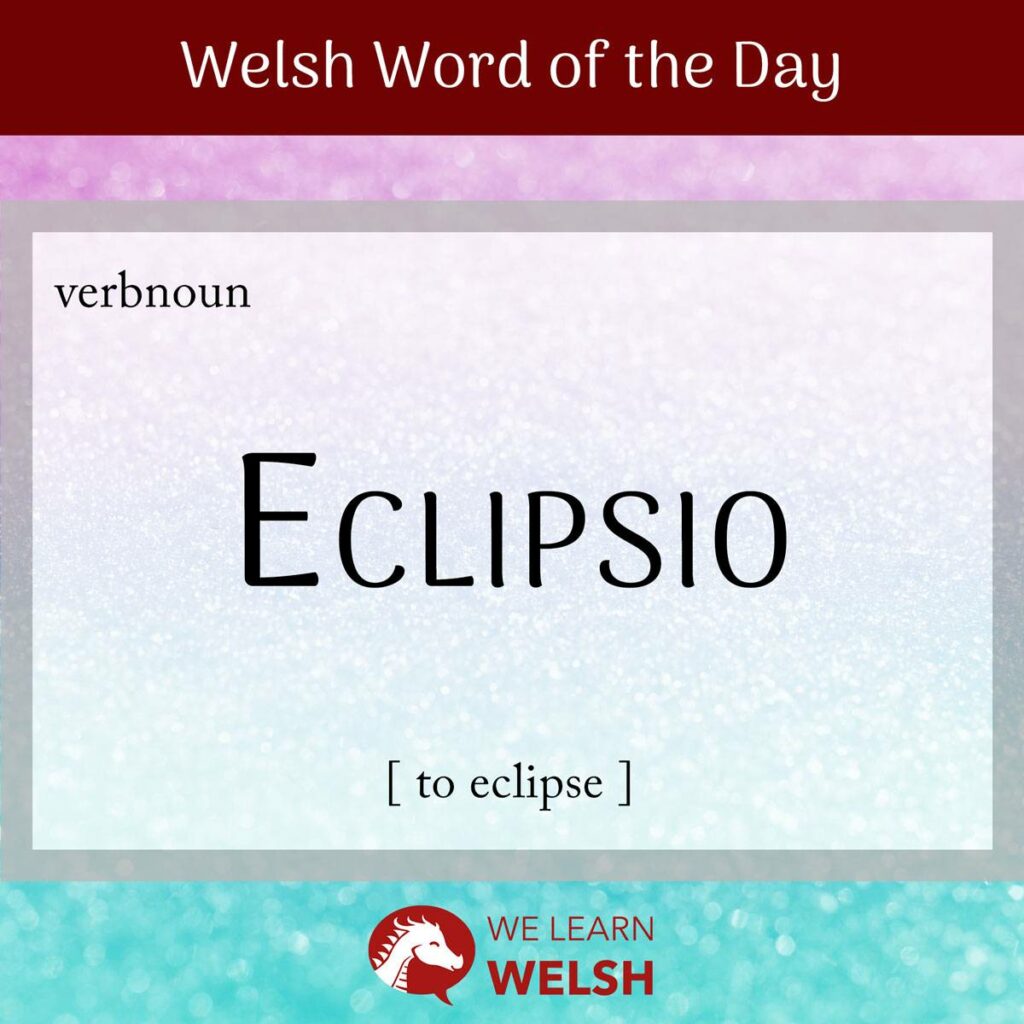We all know that Welsh is full of loanwords. But a common misconception regarding Welsh loan words is that they’ve all been pinched directly from modern spoken English very recently. In actuality, many of them are much older borrowings, having been taken from Latin or from Old English hundreds of years ago.
Variants of eclipsio (to eclipse) and eclips (an eclipse), for example, have been recorded in Welsh since the mid-1600s.
eclipsio
to eclipse
An eclipse in Welsh is diffyg ar yr haul / lleuad or simply eclips. Sometimes, eclips is shortened even further to clip – or even clipsi.
You may recognize in the first phrase the words haul (sun), and lleuad (moon), but likely diffyg (defect, lack, imperfection, blemish) will be less familiar. It does come up though in medical terms – like anemia diffyg haearn (iron deficiency anaemia)!
There are other ways to specify what kind of eclipsio is happening rather than using the long-winded phrase including diffyg. Rather than saying diffyg ar yr haul, a solar eclipse can be called eclips ar yr haul, clip ar yr haul or just eclips haul. The exact same pattern applies to a lunar eclipse, or eclips lleuad. You may also see the term eclips lloerol, which comes from the literary word lloer, an alternative to lleuad.
Even in the verbal form there are a lot of words used to describe this event. This article’s title eclipsio is very common, but you will very often hear it being described in more poetic ways, like arguddio (concealing), cysgodi (shadowing), tywyllu (darkening), or taflu cysgod (throwing a shadow).
Gwylion ni mewn syndod wrth i’r lleuad eclipsio’r haul.
We watched in amazement as the moon eclipsed the sun.
Another example is achludo, an interesting verb which comes from the Latin occludo / occludere (to obstruct, block, or cover, or in chemistry to absorb) and means the same thing. English made the same borrowing as Welsh did, resulting in the word occlude. But these verbs are parallel – the Welsh doesn’t come from the English. Achludo originally presented in Welsh as achluddo, but over time, the variant achludo has become the more common form.
In most contexts, achludo is not necessary; you could use options such as cuddio (to hide), celu (to hide, to conceal), cau (to close, in some contexts to obstruct), rhwystro (to impede), gorchuddio (to cover)… and many more.
But it does work as an alternative to eclipsio and it also shines in gwyddonol (scientific) contexts. For example, you might describe the achludo (occluding) of a gwythïen (vein) by a tolchen / clot gwaed (blood clot), the achludo (occluding / absorbing) of nwyon (gasses) by metelau (metals), or a ffrynt achludedig (occluded front) in meteorology.
So achludo and occlude are etymological twins. We already know that achludo doesn’t come from occlude, but what’s even better is that the Welsh is actually older! Variants of it are attested as early as the twelfth century by Geiriadur Prifysgol Cymru (the Welsh University Dictionary) – whereas occlude didn’t show up until the 16th, according to Merriam Webster.
Not so with eclipsio, which obviously comes straight from the English. It does have quite an interesting story anyway though – it’s likely that the form eclip or clip of the noun originally came from an incorrect assumption among seryddwyr (astronomers) using the Welsh word that eclips was a plural. Nowadays clip just functions as a colloquial-ish alternative to the full word, but originally it arose as an error!
It is possible to use eclipsio in metaphorical, non-scientific contexts, though it is overall less common than it is to use the verb eclipse in this way in English. Instead, you are likely to hear rhagori (to surpass).
Daeth yn amlwg bod ei llwyddiant hi’n eclipsio ei lwyddiant o.
It became clear that her success was eclipsing his.
The next time we see an eclips ar yr haul in the UK will be an eclips rhannol (partial eclipse) in mis Awst (August) of 2026. The haul will be covered by at least 89% from any viewpoint in the UK. There hasn’t been a total eclips ar yr haul in the UK since 1999 – and even then you could only see it if you trekked down to Cernyw (Cornwall)!

